| Listing 1 - 10 of 15 | << page >> |
Sort by
|

ISBN: 1558761152 1558761160 Year: 1997 Publisher: Princeton, NJ : Markus Wiener Publishers,
Abstract | Keywords | Export | Availability | Bookmark
 Loading...
Loading...Choose an application
- Reference Manager
- EndNote
- RefWorks (Direct export to RefWorks)
Lebanon --- Liban --- History --- Histoire --- 815 Geschiedenis --- 826 Imperialisme, Kolonialisme --- 844 Sociale Structuur --- 845 Religie --- 846 Identiteit --- 851 Burgeroorlogen --- 855.4 Militaire interventies --- 855.5 Gewapende groeperingen --- 876.1 Defensie --- 883.4 West-Azië
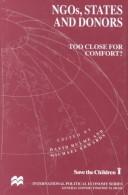
ISBN: 0333665813 0333665821 0312161905 0312161913 9780312161903 9780312161910 Year: 1997 Publisher: New York: St. Martin's press,
Abstract | Keywords | Export | Availability | Bookmark
 Loading...
Loading...Choose an application
- Reference Manager
- EndNote
- RefWorks (Direct export to RefWorks)
Development aid. Development cooperation --- Political systems --- Non-governmental organizations --- Economic assistance --- Congresses --- Developing countries --- Economic policy --- 813 Methodologie --- 821.1 Volkenrecht --- 825 Ontwikkelingssamenwerking --- 826 Imperialisme, Kolonialisme --- 837 Financiën en Bankwezen --- 841.5 Bestuur en beleid --- 843 Middenveld --- Non-governmental organizations - Congresses --- Economic assistance - Congresses --- Developing countries - Economic policy - Congresses
Book
ISBN: 9062223206 Year: 1997 Publisher: Amsterdam : Babylon-De Geus,
Abstract | Keywords | Export | Availability | Bookmark
 Loading...
Loading...Choose an application
- Reference Manager
- EndNote
- RefWorks (Direct export to RefWorks)
History of Eastern Europe --- Georgia --- Armenia --- Azerbaijan --- 812 Ideologie --- 815 Geschiedenis --- 821.1 Volkenrecht --- 826 Imperialisme, Kolonialisme --- 828 Geografie --- 841.1 Democratisering --- 844.1 Minderheden --- 845 Religie --- 846 Identiteit --- 846.1 Etniciteit --- 850 Vrede- en conflictstudies --- 860 (Vredes)cultuur --- 883.4 West-Azië --- 884.1 Oost-Europa --- Caucasus, South --- Politics and government

ISBN: 2802710117 2275015310 9782802710110 Year: 1997 Volume: 21 Publisher: Bruxelles: Bruylant,
Abstract | Keywords | Export | Availability | Bookmark
 Loading...
Loading...Choose an application
- Reference Manager
- EndNote
- RefWorks (Direct export to RefWorks)
Droits de l'homme --- Mensenrechten --- Autochtones. --- Autochtones --- Droits de l'homme (Droit international) --- Droits. --- 341 --- 800 Collectie Vlaams Vredesinstituut --- 820 Internationale Betrekkingen --- 821 Internationaal Recht --- 822.1 Verenigde Naties --- 826 Imperialisme, Kolonialisme --- 830 Economie --- 844.1 Minderheden --- 846.1 Etniciteit --- 882.2 Zuid-Amerika --- 882.3 Midden-Amerika --- 882.4 Noord-Amerika --- 885 Oceanië --- 313.1 --- Autochtones - Droits. --- DROIT INTERNATIONAL --- MINORITES --- GROUPES ETHNIQUES --- COLONISATION
Book
ISBN: 9068323628 Year: 1997 Publisher: Amsterdam : Koninklijk instituut voor de tropen,
Abstract | Keywords | Export | Availability | Bookmark
 Loading...
Loading...Choose an application
- Reference Manager
- EndNote
- RefWorks (Direct export to RefWorks)
India --- #A9710A --- 812 Ideologie --- 813 Methodologie --- 820 Internationale Betrekkingen --- 821.1 Volkenrecht --- 826 Imperialisme, Kolonialisme --- 828 Geografie --- 830 Economie --- 838.1 Ecologie --- 841.1 Democratisering --- 842 Media --- 844 Sociale Structuur --- 844.6 Samenlevingsproblemen --- 845 Religie --- 850 Vrede- en conflictstudies --- 883.5 Zuid-Azië --- 984 --- geografie Azië --- géographie Asie --- India.
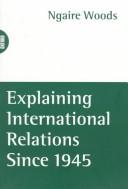
ISBN: 0198741960 0198741952 9780198741961 Year: 1997 Publisher: Oxford : Oxford university press,
Abstract | Keywords | Export | Availability | Bookmark
 Loading...
Loading...Choose an application
- Reference Manager
- EndNote
- RefWorks (Direct export to RefWorks)
Geschiedenis en theorie worden al te vaak als twee afzonderlijke benaderingen bij de studie van de internationale betrekkingen behandeld. Dit boek tracht beide te integreren. In een eerste deel wordt het nut van theorievorming behandelt. Daarna volgen een aantal hoofdstukken over belangrijke periodes en aspecten van de internationale betrekkingen na 1945. Telkens wordt geïllustreerd hoe specifieke theorieên bijdragen tot een verklaring
810 Theorie en Methode --- 814 Theorie van de Internationale Betrekkingen --- 815 Geschiedenis --- 820 Internationale Betrekkingen --- 822 Internationale organisaties --- 822.5 Europese Unie --- 826 Imperialisme, Kolonialisme --- International relations --- History. --- International relations. Foreign policy --- anno 1900-1999 --- Relations internationales --- History --- Histoire --- Diplomatic history --- International history (Diplomatic history) --- World history --- International relations - History.
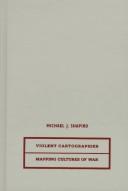
ISBN: 0816629218 081668796X Year: 1997 Publisher: Minneapolis : University of Minnesota Press,
Abstract | Keywords | Export | Availability | Bookmark
 Loading...
Loading...Choose an application
- Reference Manager
- EndNote
- RefWorks (Direct export to RefWorks)
An innovative critique of the way historians and political scientists study war. How can we resist a nation-state vision of the globe? What is needed to "unmap" the familiar world? In Violent Cartographies, Michael J. Shapiro considers these questions, exploring the significance of war in contemporary society and its connections to the geographical imaginary. Employing an ethnographic perspective, Shapiro uses whiplash reversals and bizarre juxtapositions to jolt readers out of conventional thinking about international relations and security studies. Considering the ideas of thinkers ranging from yon Clausewitz to Virilio, from Derrida to DeLillo, Shapiro distances readers from familiar political and strategic accounts of war and its causes. Shapiro uses literary and film analyses to elucidate his themes. For example, he considers such cultural artifacts as U.S. Marine recruiting television commercials, American war movies, and General Schwarzkopf's autobiography, elaborating how a certain image of American masculinity is played out in the military imaginary and in the media. Other topics are Melville's The Confidence Man, Bunuel's film That Obscure Object of Desire, and a comparison of the U.S. invasion of Grenada to an Aztec "flower war". Throughout, Shapiro draws attention to the violence of the colonial encounters through which many modern nation-states were formed, and ultimately suggests possible directions for an ethics of minimal violence in the encounter with others. The overall effect is of a complex, cumulative, and layered analysis of the historical and moral conditions of the current use of violence in the conduct of international relations. A fascinating and challenging work, Violent Cartographies will interest anyone concerned with the connections between war and culture.
War and civilization. --- War and society --- 815 Geschiedenis --- 820 Internationale Betrekkingen --- 826 Imperialisme, Kolonialisme --- 846.1 Etniciteit --- 855 Oorlogsvoering --- 858 Geweld --- 876 Veiligheidspolitiek --- 880 Regios en landen --- 882.4 Noord-Amerika --- 884.4 West-Europa --- 853 Regionale conflicten --- War and civilization --- Civilization and war --- Civilization
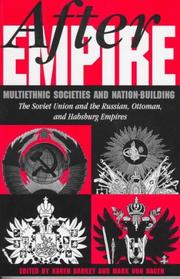
ISBN: 0813329639 0813329647 Year: 1997 Publisher: Boulder (Colo.) Westview
Abstract | Keywords | Export | Availability | Bookmark
 Loading...
Loading...Choose an application
- Reference Manager
- EndNote
- RefWorks (Direct export to RefWorks)
De Sovjet-Unie, de opvolger van het Russische tsarenrijk, was niet het eerste multinationale rijk dat in de moderne geschiedenis uit elkaar viel. Dit was vanaf het einde van de 19de eeuw ook het geval met het Turks-Ottomaanse Rijk. Na de eerste wereldoorlog verdween het Habsburgse Rijk. Deze bloemlezing met een voorwoord van Eric Hobsbawm en Charles Tilly, brengt een aantal historische, sociologische en politieke wetenschappers samen die onderzoeken wat de oorzaken waren van het verval en de ineenstorting van deze drie rijken. De auteurs waarschuwen voor al te simplistische vergelijkingen maar benadrukken tegelijkertijd ook dat zich niet blind mag staren op de concrete feiten die de directe aanleiding vormen tot de ontbinding van deze rijken. Er moet ook voldoende aandacht besteed worden aan de langere historische processen.
Imperialism. --- Impérialisme --- Habsburg, House of. --- Turkey --- Austria --- Russia --- Soviet Union --- Empire ottoman --- Autriche --- Russie --- URSS --- History --- History. --- Histoire --- 812 Ideologie --- 813 Methodologie --- 815 Geschiedenis --- 821.1 Volkenrecht --- 826 Imperialisme, Kolonialisme --- 841 Politiek Bestel --- 846 Identiteit --- 883.4 West-Azië --- 884.1 Oost-Europa --- 884.4 West-Europa --- #SBIB:94H0 --- Geschiedenis van Europa: algemeen --- Impérialisme --- Imperialism --- Colonialism --- Empires --- Expansion (United States politics) --- Neocolonialism --- Political science --- Anti-imperialist movements --- Caesarism --- Chauvinism and jingoism --- Militarism --- Ottoman Empire --- Ottoman Empire, 1288-1918
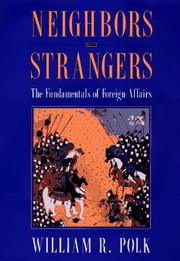
ISBN: 0226673294 Year: 1997 Publisher: Chicago ; London University of Chicago Press
Abstract | Keywords | Export | Availability | Bookmark
 Loading...
Loading...Choose an application
- Reference Manager
- EndNote
- RefWorks (Direct export to RefWorks)
William R. Polk is een historicus die ook in verschillende Amerikaanse administraties als raadgever werkte. Vanuit zijn kennis en ervaring schreef hij een uiterst toegankelijke boek met beschouwingen over de relaties tussen staten waarin zowel historische voorbeelden als elementen uit de dierenpsychologie en de gedragswetenschappen zijn opgenomen. Vooral de verhouding van een statelijke organisatie tot het vijandige andere, de vreemdeling en de andere staten wordt onderzocht zodat Polk doordringt tot de eerder abstracte of filosofische achtergronden van de internationale betrekkingen, van een defensiepolitiek, de oorlogsvoering, handel met 'vreemden' of bijvoorbeeld spionagepraktijken.
Coexistence --- Coëxistence pacifique --- Foreign affairs --- Foreign policy --- Interdependence of nations --- International relations --- Internationale betrekkingen --- Ordre mondial --- Peaceful coexistence --- Relations internationales --- Vreedzame coëxistentie --- Wereldorde --- World order --- 813 Methodologie --- 814 Theorie van de Internationale Betrekkingen --- 815 Geschiedenis --- 820 Internationale Betrekkingen --- 821.1 Volkenrecht --- 823 Diplomatie --- 825 Ontwikkelingssamenwerking --- 826 Imperialisme, Kolonialisme --- 831.1 Handelspolitiek --- 836 (Multi-)nationale ondernemingen --- 841 Politiek Bestel --- 842.1 Propaganda --- 844.6 Samenlevingsproblemen --- 855 Oorlogsvoering --- Commerce --- National security --- World politics --- Colonialism --- Global politics --- International politics --- Political history --- National security policy --- NSP (National security policy) --- Security policy, National --- History --- Government policy --- Political science --- World history --- Eastern question --- Geopolitics --- International organization --- Economic policy --- Military policy
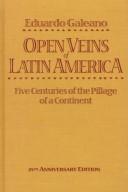
ISBN: 0853459916 0853459908 1583673121 1583673113 9781583673119 9781583673126 Year: 1997 Publisher: New York : Monthly Review Press,
Abstract | Keywords | Export | Availability | Bookmark
 Loading...
Loading...Choose an application
- Reference Manager
- EndNote
- RefWorks (Direct export to RefWorks)
Since its U.S. debut a quarter-century ago, this brilliant text has set a new standard for historical scholarship of Latin America. It is also an outstanding political economy, a social and cultural narrative of the highest quality, and perhaps the finest description of primitive capital accumulation since Marx. Rather than chronology, geography, or political successions, Eduardo Galeano has organized the various facets of Latin American history according to the patterns of five centuries of exploitation. Thus he is concerned with gold and silver, cacao and cotton, rubber and coffee, fruit, hides and wool, petroleum, iron, nickel, manganese, copper, aluminum ore, nitrates, and tin. These are the veins which he traces through the body of the entire continent, up to the Rio Grande and throughout the Caribbean, and all the way to their open ends where they empty into the coffers of wealth in the United States and Europe. Weaving fact and imagery into a rich tapestry, Galeano fuses scientific analysis with the passions of a plundered and suffering people. An immense gathering of materials is framed with a vigorous style that never falters in its command of themes. All readers interested in great historical, economic, political, and social writing will find a singular analytical achievement, and an overwhelming narrative that makes history speak, unforgettably. This classic is now further honored by Isabel Allende's inspiring introduction. Universally recognized as one of the most important writers of our time, Allende once again contributes her talents to literature, to political principles, and to enlightenment.
Latin America --- Amérique latine --- Economic conditions. --- Social conditions --- History --- Conditions économiques --- Conditions sociales --- Histoire --- 812 Ideologie --- 815 Geschiedenis --- 820 Internationale Betrekkingen --- 822.2 Regionale Organisaties --- 822.4 Internationale financiële instellingen --- 826 Imperialisme, Kolonialisme --- 830 Economie --- 831 Internationale Politieke Economie --- 831.1 Handelspolitiek --- 835 Natuurlijke rijkdommen --- 836 (Multi-)nationale ondernemingen --- 837 Financiën en Bankwezen --- 844 Sociale Structuur --- 855.4 Militaire interventies --- 876.2 Inlichtingendienst --- 882.1 Caraïben --- 882.3 Midden-Amerika --- 882.4 Noord-Amerika --- 884 Europa --- 884.2 Noord-Europa --- 884.3 Zuid-Europa --- Latijns-Amerika --- geschiedenis --- sociaal-economische geschiedenis --- geschiedenis. --- sociaal-economische geschiedenis. --- Amérique latine --- Conditions économiques
| Listing 1 - 10 of 15 | << page >> |
Sort by
|

 Search
Search Feedback
Feedback About UniCat
About UniCat  Help
Help News
News